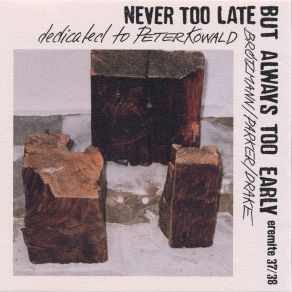Never Too Late But Always Too Early
Download links and information about Never Too Late But Always Too Early by Peter Brötzmann / Peter Brotzmann. This album was released in 2003 and it belongs to Jazz, Avant Garde Jazz, Classical genres. It contains 9 tracks with total duration of 01:54:54 minutes.

|
|
|---|---|
| Artist: | Peter Brötzmann / Peter Brotzmann |
| Release date: | 2003 |
| Genre: | Jazz, Avant Garde Jazz, Classical |
| Tracks: | 9 |
| Duration: | 01:54:54 |
| Buy it NOW at: | |
| Buy on iTunes $19.99 | |
Tracks
[Edit]| No. | Title | Length |
|---|---|---|
| 1. | Never Run But Go I | 19:20 |
| 2. | Never Run But Go II | 4:47 |
| 3. | Never Run But Go III | 9:31 |
| 4. | Never Run But Go IV | 9:51 |
| 5. | The Heart & the Bones | 18:26 |
| 6. | Never Too Late But Always Too Early I | 16:52 |
| 7. | Never Too Late But Always Too Early II | 11:02 |
| 8. | Never Too Late But Always Too Early III | 17:22 |
| 9. | Half-hearted Beast | 7:43 |
Details
[Edit]Recorded live in Montréal in the spring of 2001, this double CD, despite being dedicated to the late Peter Kowald, was actually performed before his death. The dedication is out of affection and respect rather and as something literally recorded for him. That said, Brötzmann, Parker, and Drake reveal in depth here just how they have gelled as a trio. With Parker employing the doussin gouni as well as his bass, and Brötzmann utilizing a taragato and A-clarinet, this is not a skronk session, though there are certainly elements of that, and it certainly is out in its approach. As one would expect, the intensity level is high from the jump as the band begins with the four-part suite "Never Run but Go." Brötzmann uses the clarinet like he does the tenor, blowing not out of the instrument but completely through it, expanding its sonic palette with blurred smattering tonal blurs that do not reflect the instrument's soft, round, and refined tonalities. In fact, his playing on part one, full of ribbons of legato phrases and pulsing intervallic sequences, is reminiscent of Coltrane's soprano playing on the Afro Blue Impressions concerts. Parker matches Brötzmann, coursing a pattern of rhythmic excess that leaves no space unfilled. This isn't about dynamics or tension, it's about intensity and movement, and while for these three it does not run, it certainly does go, through a series of tonal structures that were certainly directed and purposeful. Drake's rhythmic dramatics offer the clues as he returns the signatures from 7/8 and 5/8, moving into overdrive to 11/8 before downshifting again. "Pt. 2" and "Pt. 3" are all Parker and Drake creating a downright funky pop and groove. Parker states the line and Drake fills in with rubato and rim shots to accent the ends of Parker's lines. "Pt. 3" signals Brötzmann's return on the tenor, and Drake kicks it into Afro-Cuban gear as Parker circuitously pizzicatos his way through a Machito/Cachao bassline that gives Brötzmann literally everything he needs to fuse it all together in a solo that is blistering, soulful, and wrapped around three tonal figures that nod to both Drake and Parker, who don't so much follow as extrapolate, adding shifting, broken harmonics to an already splattered sonic canvas.
Disc one closes with the gorgeous "The Heart and the Bones," featuring contrapuntal designations spearheaded by Drake followed by Parker. They round off the edges of opposition and eventually come close to playing against each other, and that's where Brötzmann enters the fray, with as lyrical a statement as you are ever likely to hear him make from the bottom register of his horn — slow, mournful, spiritual, like Albert Ayler as the improvisation becomes hymn-like for quite a while before erupting into a free for all. The three-part title suite kicks off disc two as a slow, mournful, speculative exercise in bass tonality, with Parker bowing his instrument. Brötzmann moves from the low to middle register in elongated phrases, creating an architectural harmonic complexity and smearing the hell out of one- or two-note phrases. Drake shimmers with a pulse on brushes, keeping the center clean and spare. The pace picks up about six minutes in, but the spareness of the tonal language remains the same. Brötzmann may be blowing out the inside of the horn, but without flurries of notes, as Parker walks it, filling in the extra spaces behind his tonal investigation with pronounced, brief staccato lines. Drake switches to sticks and the band is off and running into the unknown. By the second movement, everything is chaotic and crazy, dark yet celebratory. The audience is screaming for Brötzmann to blow, Parker is in overdrive to add a counterweight to the flight, and Drake pushes it all further, creating a tension that seems irresolvable — and it isn't until the end of the last movement. The concert ends with a swinging blues, "Half-Hearted Beast," which is literally a barroom romp for improvisers. Never has Brötzmann played in such a guttural, vulgar, and enjoyable manner, nor has Parker walked his bass in such a straightforward way — though it is far from stride walking. Drake gets to play around all over the edges of the tune, only to bring it back on the turnarounds and carry it out into the night. A fitting end, an amazing ride, and — dare it be said — one of the most necessary of the collaborations involving these three men.